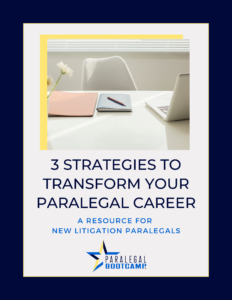Navigating your career as a paralegal can come with its challenges. This paralegal career edition of Ask Me Anything will answer questions from real paralegals who have run into their own roadblocks. Whether its learning how to specialize in certain areas or facing an upcoming interview for your dream job,I’ll dive into strategies to help you overcome paralegal career obstacles that may be similar and get back on track and achieving your goals.
Prefer Audio Instead of Reading?
I just started a new specialization (Estate Planning and Probate) and know very little about it. Where can I go to absorb a large amount of information quickly while working full-time to feel confident enough to understand what I do as a paralegal and be able to explain the services we offer to potential clients? The firm I work for only offers attorneys training on the job.
How to Bridge the Gap
This is a hard one to kick off our paralegal career edition of Ask Me Anything. It’s hard because there really are no post-certificate training programs on estate planning and probate. It’s a shame. I get asked by legal administrators all the time if we have an estate planning course. We have litigation, personal injury, billable hour boot camp, trial prep boot camp, etc., but we don’t have estate planning.
Here’s why: I have yet to find a senior paralegal who specializes in estate planning – who also has the time and desire to get paid to create a course on the side after working 40 hours per week.
This is what I would suggest you do: absorb everything your attorneys are doing around you and write it all down.
When they use a word or a phrase or mention a document that you’ve never heard of, go look it up and write it down. Start a notebook, preferably electronically that you can then search when it comes up again.
Do the same thing when you hear them reference a new rule or regulation in that area of law that you don’t know what it is. Another thing I would suggest is to go read the rules, word for word.
You may want to try to find a book on estate planning and probate, even if it is an attorney because you can probably gain a lot of information from that. Check out LinkedIn boards or groups for estate planning and probate paralegals.
I’m really proud of you for wanting to absorb that information and be able to explain the service the potential clients. It’s a great and popular area to be in so stick with it!
Learn 4 ways to transition into a new paralegal role smoothly.
Litigation Paralegal Boot Camp
Are you tired of being the Panic Mode Paralegal who spends your days playing whack-a-mole with last-minute rush projects because you’re waiting for someone to show you what it takes to be great litigation paralegal?
This is the only program of its kind that provides litigation paralegals with all of the tools to master litigation cases from the complaint through the trial, and everything in between.
You will be the Confident Case Strategist faster than you ever imagined possible.

I’m stuck and I’m hoping you can help. I recently accepted a new paralegal position, and much to my utter astonishment, the firm lacks technology. The majority of the lawyers are older and have expressed hesitation when it comes to switching from dictation, handwritten edits to pleadings, and hard copy files. I believe that if I stay at my current employer, I will miss out on technical advancements, particularly eDiscovery. I asked the office manager about bringing in new technology, and she replied, “Good luck with that.” Should I quit after just three weeks, and if so, how do I explain that to potential employers?
Technology Matters
Here’s my concern with staying at that firm: the longer you stay, the further behind you will become with your technology skills. Let’s say that you stay there for 2-3 years just so that it looks better on your resume.
Now when you go to interview at another law firm who expects a paralegal with your years of experience to know the basics of eDiscovery technology and other litigation technology, you won’t have that experience. You will most likely be limiting your future job opportunities the longer you stay at that firm.
Essentially by staying at a firm that’s so far behind technology like that, you are putting your career security at risk.
Here’s why career security is important.

Making the Move
Here’s the thing: I am a true believer that the grass is almost never greener on the other side of the fence. I also believe that hiring managers do hesitate when they see a resume with too much job-hopping. Now, that being said, I’ve also seen a trend where it’s not as important as it was even 5 or 10 years ago. Back when I was a paralegal manager, pretty much everyone was of the opinion that it was better to hire someone who had long terms of employment at fewer firms.
For example, if I was looking at two resumes with the same 10 years of experience and one of them was from a paralegal who had 5 years at one firm and 5 years at another firm with the other paralegal having two positions of less than two years and two positions at three years each. There would be a partial preference towards the paralegal who had those ten years of experience at only two firms.
However, the trend now is to not place as much importance on that because employers now understand that employees don’t stay at one place for twenty or thirty years anymore. Not all employers, but many of them do understand that people do move around, especially in their first ten years.
One final thing I would add here is to be really careful about your next move. Don’t rush it and jump into another firm only to find out they’ve got great technology, but a reputation for burning people out and they’re a revolving door.
People can forgive one jump because of a bad decision; two in a row is a little harder to get past.
I am currently a secretary at a law firm. One of the paralegals is quitting his job and the company is giving me an opportunity to interview for the position. What advice would you give me? I have one year left of school for my paralegal certification, and there are going to be a lot of people more experienced than me interviewing for the position. I’m 21 years old and I’m afraid they will think I’m too young!
Acing the Interview for Your Dream Paralegal Job
First of all, congratulations that they’ve offered you the opportunity to interview for the position! That’s one hurdle out of the way. That tells me that they already have a good idea of your work ethic, they think you’ll be a good personality fit, and they probably recognize that you’ll be trainable. If they didn’t think all of those things, they wouldn’t have offered you this opportunity.
So while the more experienced paralegals might have the advantage of experience; you have some advantages too. And they are big ones. See, they might interview some paralegals who have great resumes, but during the interview they discover that it won’t be a good fit for the culture of the firm, or they want too much money because they’re already at a high salary for all those years of experience and they’re going to want at least $5-$10,000 more in order to leave their firm.
Maybe they’ll luck out and find someone who is wanting to make the move for a different reason and getting a jump in salary isn’t as important. They still are taking a big gamble with an outside new hire. Every employer is taking a gamble anytime they hire someone new.
One thing I want you to do is read the interview I did with Kim Barrett last year. She started at her firm as a part-time night receptionist and moved her way all the way up to firm-wide director of paralegals. It’s about the highest position you can go as a paralegal in a law firm. She gave some great advice on how she made those moves and talked about the interview process and more. Read it here.
🌟 Check out this interview with Ann where she shares her career journey.

The question on whether or not they will think you are too young – I think if that mattered to them, they wouldn’t have offered the opportunity to interview. I want you to get that negative mindset out of the way right now. If you go into the interview thinking that, then subconsciously you might not act as mature as you actually are. Mindset can do crazy things. It can help you if it’s a good mindset or it can hurt you if it’s a bad mindset.
So let’s get a good mindset and say to yourself “they wouldn’t have offered me an opportunity to interview if they thought I was too young.” That’s the truth. They could have easily said “since you haven’t completed your paralegal certificate program yet, we can’t consider you for this position, but maybe we can in the future when you’ve completed the program.” That would give them at least another year to let you mature some more without saying “You’re too young.” But they didn’t say that.
Go into that interview and be yourself. The person that they see every day. That’s what will help you land that position.
Get tips on how to be a confident paralegal.

Free Strategy Guidebook for
New Litigation Paralegals
Are you ready to fast-track your litigation paralegal career?!
Our free guidebook reveals three powerful strategies that will set you up for success in your journey. If you’re ready to seize this opportunity and thrive as a litigation paralegal, sign up below, and get started now!
I’ve been in-house doing contracts for almost 10 years. Honestly I am mad at myself for letting it continue but I believed I would move to another job within the company but I make a good salary. I am an older worker but not wanting to retire yet. How do I kick-start my job search and also overcome age bias as I have applied for a few things but get turned down? I used to get job offers all the time. And there are articles I read about age discrimination being a real thing. Thank you.
Overcome Age Bias in Your Job Search
I wish I knew your age, because then I could be a little more specific in my answer, so I’ll give a couple of ranges.
Warning: some of this is something that no one is going to say out loud, but I will.
If you are 60 or over, yes – there is age bias out there. No one’s going to tell you that. Of course not, because that’s discrimination. But it’s real. If you’re over 60 and not getting called for interviews, it’s probably because you have dates in your resume that someone can easily add up and estimate how long you’ve been in the workforce.
Is that fair? Absolutely not! But does it happen? Yes, it does.
Now let me play the devil’s advocate here and assume you’re a 62-yr old paralegal applying for positions and the potential employer is adding up the dates in your resume and they assume you’re somewhere around 60-64. Their mindset is, this person only has another 2 to 5 years before retirement and then we’re going to be back to the drawing board trying to fill this position again.
They don’t know from your resume that maybe you’re a healthy, vibrant 62-year old who plans to work until at least 70 or 72. Then address that in the cover letter! Or, don’t let them make the assumption of your age by not including dates on your college degree, and maybe get rid of some of your early job history on your resume.
Here are 3 mistakes that could be preventing you from landing your dream paralegal job.

Tailoring Your Resume
WHAT? ANN, that’s lying! No, it’s not. It’s a lie if you’re filling out a job application and they ask for every single employer you’ve ever had for your entire professional career.
Your resume is your personal marketing brochure. You don’t need to put every single job you’ve ever had on your resume. You want to use the white space of your resume to sell yourself to that potential employer.
I recommend you also check out our job search Q&A. One of things I tell people who are doing a job search is to first look at the place in your job search where you’re not seeing results.
For example, if you’ve sent your resume out to 20 posted positions and you haven’t had a single call-back for at least a telephone interview, then something is in your resume that’s wrong. Maybe it has a couple of typos that you don’t see. Or it doesn’t show a potential employer how you can add value to them. Or, you’re applying for positions that are outside the experience that you have listed on your resume.
If you’ve sent your resume out to those 20 posted positions and you’ve received 5 or ten call-backs but no offers, then it’s something you’re doing in the interview.
Learn about pursuing a career in compliance and privacy.

Get Your Questions Answered
I’m starting a new kind of episode that I may do once a month if I keep getting the number of questions I’ve already received. We sent out an email to our subscribers and said Ann wants to do an Ask Me Anything episode, so send in any question you have that will help you in your paralegal career and gain confidence as a paralegal. I’ve looked at all of them and don’t even think I’ll get through them in one episode. There are some GREAT questions! If you’d like an opportunity to send in your questions for the Podcast Show subscribe below!
Meet the Author

Ann Pearson is the Founder of the Paralegal Boot Camp, and host of the Paralegals on Fire! Podcast Show, and passionate about promoting the paralegal profession.
Ann spent 20 years working as a paralegal manager and a litigation paralegal before opening the Paralegal Boot Camp in 2010. Her training programs focus on adding immediate value to a paralegal’s career and bridging the gap between what a paralegal learns in school and what they actually do on the job.
When Ann is not working, you can usually find her somewhere near the ocean – either boating, scuba diving, or rescuing sea turtles.

























